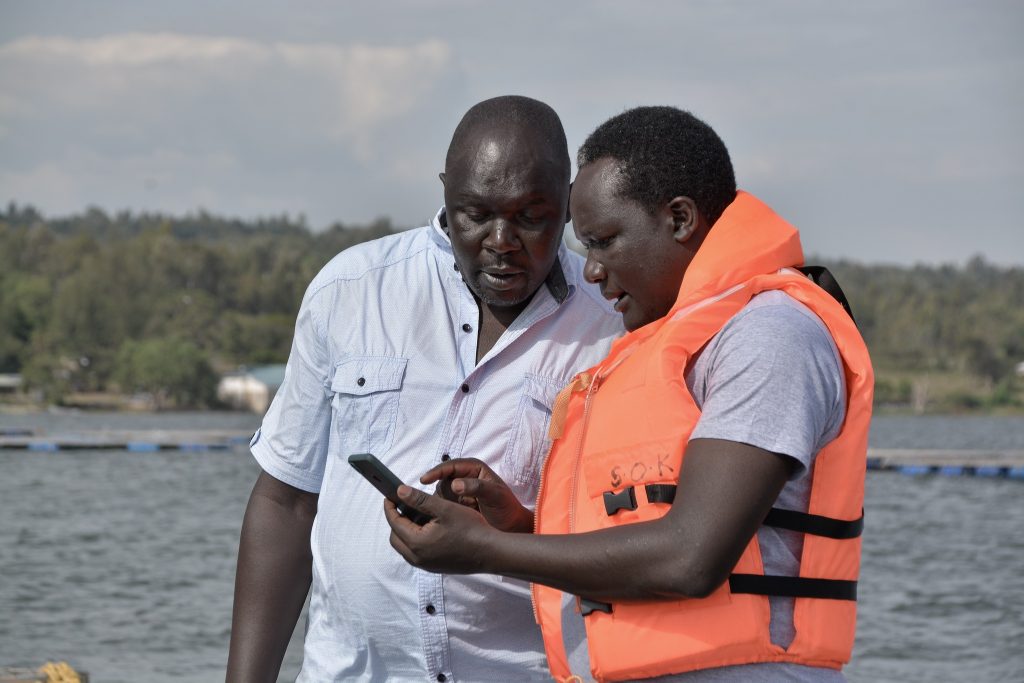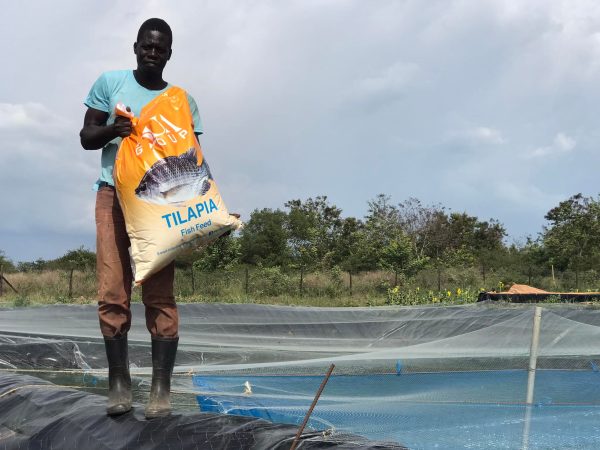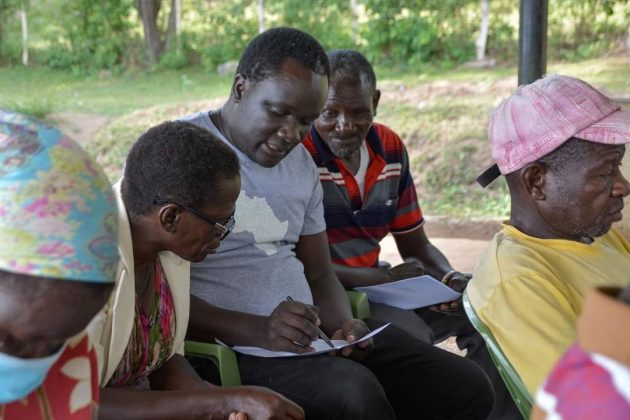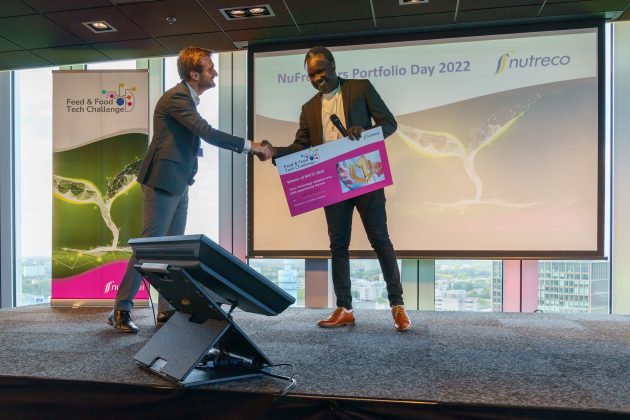
Features
Systems management
Technology
Revolutionizing Africa’s aquatech
Kenya's first fish farming platform could transform African aquaculture
February 3, 2023 By Bob Atwiine
 Aquarech founder, Dave Okech, (right) teaching a local fish farmer how to use thermometor sensors in the fish cages. (Photo: Aquarech)
Aquarech founder, Dave Okech, (right) teaching a local fish farmer how to use thermometor sensors in the fish cages. (Photo: Aquarech) In Kenya, fish farmers are reaping fortunes from the opportunities brought by the new fish farming digital platform which has improved their business and profits since it allows them to own an essential part of the whole fish business value chain.
Launched at the start of the COVID-19 pandemic, Aquarech is Kenya’s first fishing platform, also first of its kind on the Africa continent. It was invented by Kenya’s aquapreneur, Dave Okech, in 2020. He operates in Kenya’s North West third largest city of Kisumu located along Lake Victoria, the world’s largest tropical lake which is shared by three countries of Uganda, Kenya and Tanzania.
Okech says Aquarech was founded out of his experience as a cage fish farmer in Lake Victoria. He discovered that he and his fellow fish farmers could not access top quality feeds and that the fish market was also completely unstructured.
“There was no proper technical capacity to understand how to feed the fish,” he says. “The ecosystem lacked medium of communication and this made business very difficult. So we had to come in and provide that medium through our platform through which all these various actors would communicate to each other.”
Okech left his work as a fish farmer in 2020 so that could dedicate himself in building out a platform that could fix his fellow farmers’s challenges in the sector.

A farmer carries fish feeds purchased through use of Aquarech mobile app. (Photo: Aquarech)
How it works
AquaRech platform was developed in 2019 as a unique model to unlock the potential of small-holder fish farmers in Kenya and, eventually beyond the Kenyan borders. The mobile app incorporates a centralized database system that connects fish farmers, fish traders, and feed suppliers.
A farmer can log in to the system, register on the platform from the application and gain access to high-quality floating fish feed through its mobile app, thus creating a unique e-commerce aquafeed marketplace for subscribers. It has become a premier platform for the segment by helping growing mid-scale fish farmers purchase high-quality inputs, as well as access fish traders for off taking.
“Once we have proven that the user is recording daily production data and is a fish farmer, he or she is subsequently monitored for credit,” explains Okech. “As the farmer continues, we guarantee him or her immediate market access for his fish as soon as they are ready for sale.”
Aquarech aggregates the fish from the farmers through its facilities and fishing centres and then it channels the fish produce to the traders through its different outlets. The platform is also offering fish farmers who sell through the platform easier access to fish feed through a “Buy Now, Pay Later” financing model.
The mobile app also includes technical climate technologies an Internet of Things (IOT). Assisted by remote sensors, this technology allows farmers to monitor temperature and other vital variables on the farm, learn about best fish farming practices, and incorporate data-driven management practices. Okech explains that access to this data makes it possible for farmers to shorten fish growth cycles by over 30 per cent and decreases harvest mortality. The platform provides bulking centres and cold chain facilities to aggregate fish supply from the fish farmers and builds deals with fish traders directly.
Aquarech recently introduced an unstructured supplementary service data (USSD) option for none smart phone users but Okech says users are limited on the services they can access on the platform.
Sex for fish
Some 30 per cent of women fish mongers in Kenya are involved in “sex for fish” vice locally termed as “Jaboya,” according to a recent study by the Kenya Marine research institute.
These mainly include widowers who have to fend for their families. The vice is rampant on the shores of Lake Victoria where the problem is driven by poverty and diminishing fish stocks because of overfishing. As poor women scramble for small fish stocks on the lake shores, some beg to take fish on debts and men use it as bargaining power to sleep with them before they can give them fish. Others are forced into sex by men fish mongers after they fail to clear their debts.
However, with cage fish farming increasing the supply of fish for sale, the incidents of sexual exploitation has come down over the years. Kenyan officials also attribute this to Aquarech for bringing the numbers down further.
Okech explains that “sex for fish” existed on Kenyan lake shores because women do not have access to alternative sources of fish. The platform is now provides those alternative sources of fish to women who used to fall victims of sex for fish at the comfort of their phones.
“Women now able to use our platform and get access to information, buy fish from the same platform, and we are able to deliver it to them. We are basically providing women with alternative sources of fish at their fingertips,” he says.
This, he says has been one way of relieving pressure on one woman relying constantly on one particular fish landing site where she has to be manipulated in order to get fish.

Aquarech founder, Dave Okech, engaging local farmers on better fish farming practices and improving their outputs. (Photo: Aquarech)
Aqua-impact
To date, Aquarech has more than 2,000 fish farmers using the platform and more than 100 fish traders all distributed across Kenya. Okech tells Hatchery International that this has contributed directly to the sustainable production of over 10,000 metric tonnes of cultured fish.
“The platform has been able to reduce production cost of farmers by 30 per cent, increasing the farmer’s income by 50 per cent and fish production cycle by 35 per cent,” he says.
Okech believes this technology also has benefits that extend to the environment. By giving local fish farmers access to technical information and market intelligence on the importance of water quality monitoring, it educates them in how to use natural resources more responsibly. Greater productivity and use of technology helps the whole value chain decrease food spoilage, he says.
Fish traceability is another benefit that the app can provide. Though the local e-commerce platform, users are encouraged to buy local fish, instead of Chinese fish imports.
“We are the first ones to develop IOT temperature sensors that improve farmers’ productivity, so potentially, we are looking at Aquatech revolution in the aquaculture sector in Africa,” he says.
Just the beginning
Okech stresses that one of the major challenges in the fish supply is skyrocketed prices of fish feeds due to the Russia-Ukraine war.
“Fish feeds rely a lot on wheat products and you know Russia and Ukraine supply about 30 per cent of wheat globally. What has happened is that by global shortage of supply, prices of fish have sky rocketed by over 40per cent and fish feeds price also increase by 40 per cent,” explains Okech.
This has led to reduced profit margins for farmers. Okech says that the platform cannot be able to bare all the price problems, so the farmers have to be part of it.
“What we have done is that we have subsidized the prices of feeds by almost 30 per cent because farmers also have to absorb the shock of the increased feed prices,” he says.
However, Okech believes that despite some challenges, the sector can still feed the world with farmed fish because compared to other sectors like livestock and poultry, aquaculture is one of the best vertical integrations. In Africa, he foresees few large scale farmers or companies, and millions of small or medium scale farmers producing fish.
The platform plans to tap into other vast fish markets in Uganda and Tanzania next year 2023, followed by West Africa in subsequent years.
The innovator Dave Okech has received numerous awards for his many efforts in the fish farming industry in Kenya. These include the Mandela Washington Fellow 2016, the Acumen Fellow 2019, and the Global Farmer Network Fellow 2020. Last October, Okech won Nutreco’s 2022 Feed & Food Tech Challenge.

Aquarech founder, David Okech, receives the 2022 Feed & Food Tech Challenge award on-stage at a Nutreco event on Oct. 11, 2022 in Amsterdam. (Photo: Nutreco)
Print this page
Advertisement
- Cadman Capital joins Urchinomics to accelerate next stage of growth
- Scottish semi-closed farm pioneers to fight planning rejection





